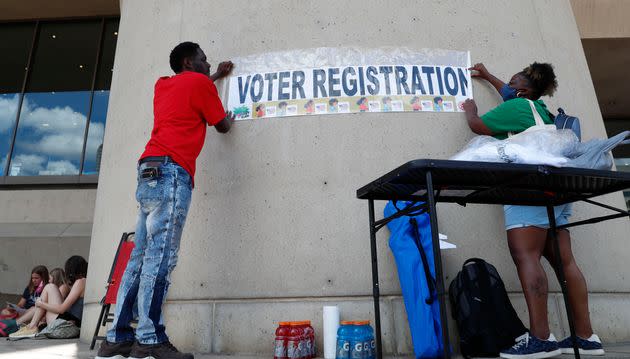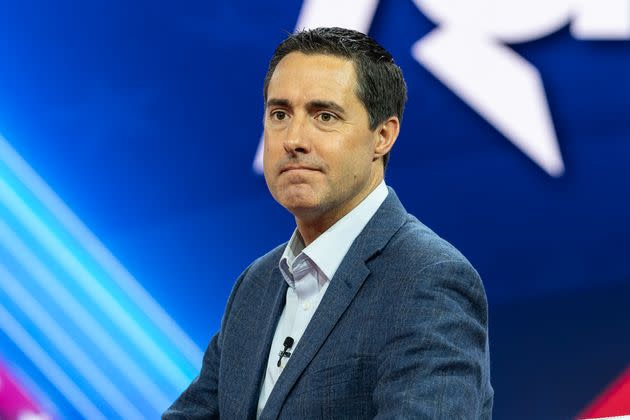9 Republican States Left A Bipartisan Election Integrity Group. Now, They’re Struggling To Replace It.
- Oops!Something went wrong.Please try again later.
- Oops!Something went wrong.Please try again later.

Jay Ashcroft and David Becker
After abandoning a bipartisan coalition designed to encourage clean voter rolls, several Republican states are learning the hard way that doing the work on their own isn’t so easy.
For years, ERIC, or the Electronic Registration Information Center, worked in relative obscurity. Member states, which at ERIC’s peak last year reached 34, including key presidential battlegrounds, shared information about their voter rolls in a central exchange. The program revealed voters who were registered in two states, unregistered citizens who were nonetheless eligible to vote, and, occasionally, evidence of illegal double voting.
The system appealed to both Republicans and Democrats, offering data to help keep voter rolls up-to-date and also ease the process of registering eligible voters. Then, the far-right attacks came.
In January last year, Gateway Pundit, a site that’s pushed anti-vaccine and election lies in the past, falsely accused ERIC of being a George Soros-funded effort to help Democrats.
Within days, Louisiana’s secretary of state announced he would withdraw his state from ERIC, citing “media reports about potential questionable funding sources” among other reasons, and becoming the first ex-member in ERIC’s decade-long history. Then, this January, Alabama followed suit. In March, Donald Trump called ERIC a “terrible Voter Registration System that ‘pumps the rolls’ for Democrats and does nothing to clean them up.” That same day, Missouri, Florida and West Virginia announced their departures. By July, Texas joined what had become an exodus, following Ohio, Iowa and Virginia in announcing its departure. (Texas’ resignation goes into effect next month.)
As the 2024 presidential election approaches, the former ERIC members are now struggling to replace the organization.
On Thursday, Ohio announced individual data-sharing agreements with Florida, Virginia and West Virginia, and West Virginia announced similar deals Friday with the same states. But several of those agreements, reviewed by HuffPost, fell well short of ERIC’s capabilities.
Some secretaries have acknowledged the difficulty of trying to replace a multi-state organization on their own.
“There are still some limitations because we’re not getting other states’ data,” Jay Ashcroft (R), Missouri’s secretary of state who pulled his state from ERIC in March, told HuffPost in an interview, referring to the fact that non-ERIC-members can’t automatically check their voter rolls against ERIC’s remaining 25 member states.
Ashcroft, now running for the Republican nomination for governor of Missouri, pointed out that certain data-sharing was optional even within ERIC ― namely, data concerning voters’ participation in elections, which can help uncover double-voting. But overall, there is no comparable collective help or resources for the states that left, which has drawn criticism from observers concerned about election integrity.
“It’s disappointing that states are leaving a tool that helped them better secure elections,” said David Becker, who created ERIC and was a non-voting board member in the group until March. “And I think this is consistent with a larger theme that I’ve seen, which is that a lot of the anti-democratic forces out there are dismantling the infrastructure of election security while claiming to secure elections.”

Aetry Jones, left, and Caerry Rigbon tape up a voter registration sign on Dallas City Hall before a Juneteenth 2020 celebration in Dallas on June 19, 2020.
The trouble comes mostly in the type of information ERIC works with ― including, crucially, state-by-state driver’s license records and other sensitive information. In contrast, replacement efforts are mostly dealing in more accessible data like the Postal Service’s change-of-address database, which can lead to numerous “false positives” that can bog election offices down ― just imagine two voters named “John Smith” who happen to have the same birthday, then project that across more than 150 million voters nationwide.
The irony of the nine states’ departure from ERIC was their enthusiasm and praise for the organization while they were members. DeSantis, in 2019, called ERIC “the right thing to do for our state,” and Iowa Secretary of State Paul Pate (R) told NPR ERIC was “a godsend” a month before he announced Iowa’s departure from the group.
As The Bulwark observed in May, “To the GOP of yore — of, say, the Tea Party era — this all sounded like a dream: a privately funded nonprofit getting states to cooperate in an effective way for a de minimis amount of money to cut down on voter fraud before it even happens.”
In Florida, a man was arrested for double voting on the same day DeSantis-appointed Secretary of State Cord Byrd (R) announced that Florida had “lost confidence in ERIC” and would be leaving the organization. Pinellas County’s supervisor of elections said the alleged crime was uncovered “because of Florida’s relationship with ERIC.” The defendant, Phillip French, has pleaded not guilty.
Virginia, a founding ERIC member state and the other location French is alleged to have voted, announced its departure from ERIC a few months after the arrest.
Similarly, five months after Ohio announced its departure from ERIC, a judge found a Trump donor, James Saunders, guilty of double-voting in that state and Florida in 2020 and 2022. State officials caught Saunders using ERIC data, the Ohio Capital-Journal reported.
The exodus from ERIC began last January with the false claim from Gateway Pundit that money from conservative bogeyman George Soros was used to fund ERIC and that Soros had “founded” the group. Both Becker and ERIC’s executive director, Shane Hamlin, have refuted the claims. ERIC started more than a decade ago with help from Pew Charitable Trusts, where Becker once led the elections program, and since then has been funded by member states’ dues.
Nonetheless, Gateway Pundit is influential ― it was the most cited source found in menacing messages sent to election officials, Reuters reported in 2021 – and the attacks spread. As NPR, VoteBeat and other outlets have detailed, Republican secretaries of state started to feel the heat.
“You can see where somebody who’s out there trying to prove their conservative bona fides in a primary, which is what you do, would read this [Gateway Pundit] article and say, ‘OK, that thing is bad, let’s get our state out of it,’” Ohio Secretary of State Frank LaRose (R) told NPR in February. “But hopefully, over time, the noise about this starts to die down, and other states look to get back into it.”
A month later, LaRose ―who in July announced a bid for the state’s 2024 Senate nomination ― announced Ohio’s departure from ERIC.

Frank LaRose, Ohio secretary of state, speaks on the third day of the CPAC (Conservative Political Action Conference) Washington, D.C., conference at Gaylord National Harbor Resort & Convention.
Though Republican secretaries of state ― and, in Texas’ case, Republican legislators ― decided for the nine former ERIC states to leave the compact, the departures largely impacted officials a rung lower on the political ladder ― county officials, who are largely tasked with maintaining voter rolls.
“We’ve just gone back to the dark ages without ERIC,” commented Polk County Supervisor of Elections Lori Edwards, a nonpartisan election officer first elected to the post in 2000, after Florida announced its ERIC departure in March. The state joined ERIC under Gov. Ron DeSantis (R) in 2019, after much urging from county officials trying to keep track of people moving in and out of the state, and those same officials were “blindsided” by the departure, the Sun Sentinel editorial board reported.
Several election officials who removed their states from ERIC said they could do the job independently.
A spokesperson for Louisiana’s Secretary of State, Kyle Ardoin (R), told HuffPost, “We have developed our own interim process using Louisiana-based, as well as national, data sources to achieve many of the report-based elements of ERIC.”
“We are internally going through data ourselves,” Ashcroft said of Missouri. “Frankly, we’re finding that we can do more than we maybe could have done five or six years ago in-house.”
Some states are working on piecemeal agreements with each other, though so far, state-to-state agreements don’t measure up to ERIC.
For example, a five-page memorandum of understanding between Ohio and West Virginia, signed by both secretaries of state offices on Wednesday, says only that the states will provide each other with lists of registered voters “on an agreed upon frequency”; ERIC members provide such data at least every 60 days.
The agreement also includes only general data, such as voters’ addresses, registration dates, and jurisdictions, whereas ERIC states also share DMV records, allowing for more exact matching and fewer false positives.
West Virginia has struck similar agreements with Florida and Virginia, according to copies shared with HuffPost by West Virginia Secretary of State Mac Warner’s (R) office, and another deal is said to be “nearing” with Tennessee. Landon Palmer, a spokesperson for the office, said West Virginia would eventually use DMV data from the American Association of Motor Vehicle Administrators’ “State-to-State Verification Service,” which he asserted provided the same data as ERIC does to its member states.
Palmer also stressed the agreements were meant to identify illegal voting ― not replace ERIC’s list maintenance work. For that, he said, the state “has shifted its focus to ultimately finding a 50-state solution using other tools and reliable data sources.”
On Monday, Alabama Secretary of State Wes Allen (R), who’d announced his state’s ERIC withdrawal just after being sworn into office, heralded the creation of the “Alabama Voter Integrity Database,” or AVID, and said the state had signed memorandums of understanding with Arkansas, Florida, Mississippi, Tennessee and Georgia ― the latter of which is still an ERIC member. A press release from Allen’s office referred to AVID as a “replacement for ERIC.”
Virginia’s Department of Elections spokesperson told HuffPost it was “pursuing data sharing agreements with other states, supplementing internal list maintenance processes with more data, and successfully updating more voters’ information than ever before.”
For state-by-state records, Becker pointed out that even if every non-ERIC state participates in individual agreements with each other, the result will be a mass of potentially hundreds of data transmission points, providing more opportunity for data breaches than with ERIC’s model.
And while states can buy certain data, like the Postal Service’s change of address file and Social Security death records, those resources can be expensive, and the cost of the lists is built into ERIC’s membership dues. Before ERIC, similar efforts at creating an inter-state election integrity system ran into data quality issues and privacy lawsuits, and none survived.
States who’ve remained in ERIC maintain it’s the best option available for keeping voter rolls clean and identifying eligible but unregistered voters.
Georgia Secretary of State Brad Raffensperger (R), a rare Republican who’s forcefully pushed back against Trump’s election lies, told HuffPost in a statement, “Georgia’s membership in ERIC, which began in 2019, has provided data to cancel over 125,000 outdated voter records, has moved more than 300,000 records to Inactive status, and ERIC is still the best available tool for effective voter list maintenance.”
“I just think it’s going to be extremely difficult to stand up anything that has the reach, quality or security of ERIC,” said Minnesota Secretary of State Steve Simon (D). “It’s a very expensive thing to do, it’s a complex thing to do, so there are a lot of barriers facing anyone else trying to do it in a meaningful way.”
And Ellen Lyon, deputy communications director of the Pennsylvania Department of State, told HuffPost in an email that despite “baseless conspiracy theories and disinformation,” the department “believes strongly in the value of the data we receive and remains committed to ERIC.”
I just think it’s going to be extremely difficult to stand up anything that has the reach, quality or security of ERIC.Minnesota Secretary of State Steve Simon
After the Gateway Pundit attacks, multiple Republican secretaries of state who’d later leave ERIC began pushing for changes to ERIC’s rules, like eliminating non-voting board member seats like Becker’s, making the sharing of election participation information compulsory, and most importantly, loosening the requirement for states to contact eligible-but-unregistered voters ― what Gateway Pundit had referred to as “essentially a left-wing voter registration drive.”
Ashcroft, in particular, had switched sides on the latter issue since he oversaw Missouri’s joining ERIC in 2018. At the time, Ashcroft praised ERIC’s ability to “identify unregistered voters so we can help them get registered.” But five years later, leaving ERIC, he faulted the compact’s focus “on adding names to voter rolls by requiring a solicitation to individuals who already had an opportunity to register to vote and made the conscious decision not to be registered.”
Explaining the change, Ashcroft said he believed state election officials had put their “thumb down on the scale” of registration drives, intending to help Democrats, he said. He noted that Becker’s current organization, the Center for Election Innovation & Research, had distributed grant money from Mark Zuckerberg’s foundation to election officials in 2020. Though the money was distributed to states and election offices run by both parties as well as non-partisan administrators, Republican critics allege the so-called “Zuckerbucks” had both a partisan intent and effect.
And though he and others have maintained they weren’t influenced by the Gateway Pundit stories, Ashcroft defended the central falsehood in the articles.
“Are you saying Soros money never was a part of ERIC?” he said, before adding of the Soros funding claim, “It’s a lot closer than the Russian collusion hoax was.”
Becker ― who announced he wouldn’t accept a renomination to the ERIC board the week after Missouri, West Virginia and Florida announced they would leave the group ― objected to Ashcroft’s accusations of partisanship.
He pointed to a letter of support from Republican election officials and noted that, during his time in the George W. Bush Justice Department’s voting rights section, he was awarded a commendation for a fight against Democrats’ gerrymandered districts in Georgia. The commendation, he said, was signed by none other than the U.S. attorney general at the time, Ashcroft’s father, John Ashcroft.
As for ERIC, the organization’s founder said he thinks it’s survived the loss of nearly one-third of its members.
“But the future of ERIC isn’t what’s important here,” Becker said. “The quality of election administration and voter list maintenance is what’s important, and the states who are still using ERIC are still getting that value.”
